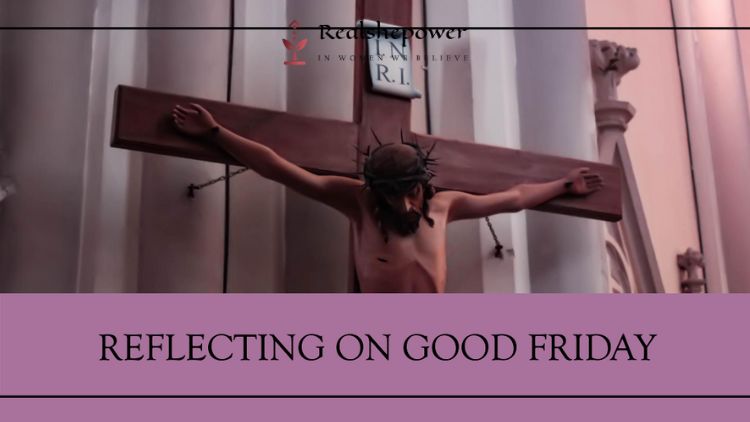Good Friday: A Day of Reflection, Sacrifice, and Hope


Good Friday, a seemingly paradoxical name for a day steeped in solemnity, falls on the Friday preceding Easter Sunday. For Christians around the world, it marks a poignant moment in the holy week, a time to commemorate the crucifixion and death of Jesus Christ. But why is it called “Good” Friday, and what significance does this day hold for believers?
Unveiling the “Good” in Good Friday
The term “Good” in Good Friday can be a source of confusion. It doesn’t signify a day of celebration or joy. Instead, it points to the underlying meaning and purpose behind Jesus’ sacrifice. Here’s a breakdown of the interpretations:
- Victory over Evil: Christians believe Jesus’ death on the cross signifies the ultimate victory of good over evil. His sacrifice represents the defeat of sin and death, paving the way for salvation. In this sense, the “good” refers to the positive outcome of Jesus’ suffering.
- God’s Unconditional Love: Good Friday highlights the immense love God has for humanity. He was willing to send his only son to die a painful death for the sake of humankind. This act of selflessness embodies the “goodness” of God’s intentions.
- Fulfillment of Prophecy: The crucifixion of Jesus wasn’t a random event. Many passages in the Old Testament foreshadowed the coming of a Messiah who would suffer and die for the sins of the people. Good Friday, in this view, signifies the fulfillment of these prophecies and the “goodness” of God’s plan.
Beyond the Label: A Day of Profound Reflection
Good Friday is a somber occasion, a stark contrast to the joyous celebrations of Easter Sunday. Here’s how Christians traditionally observe this day:
- Worship Services: Churches hold special services focusing on the Passion narrative, recounting the events leading up to Jesus’ crucifixion. These services often incorporate scripture readings, hymns, and sermons that reflect on the significance of Jesus’ sacrifice.
- Fasting and Abstinence: Many Christians choose to abstain from certain foods or activities on Good Friday as a form of penance and solidarity with Jesus’ suffering.
- Veneration of the Cross: The cross, a symbol of Jesus’ sacrifice, becomes a focal point for devotion. Some churches hold veneration ceremonies where the faithful can approach the cross for prayer and reflection.
- Personal Reflection: Good Friday is a time for personal introspection. Christians are encouraged to contemplate the meaning of Jesus’ death and how it applies to their own lives. This might involve considering themes of forgiveness, repentance, and the power of faith.
Beyond Denominations: A Shared Observance
While specific traditions may vary slightly across Christian denominations, the core message of Good Friday remains consistent. It’s a day to remember Jesus’ sacrifice, the impact it has on humanity’s salvation, and the hope it offers.
The Weight of Sacrifice: Exploring the Significance of Jesus’ Death
The concept of Jesus’ sacrifice might seem abstract. But what exactly did Jesus give up, and why is it considered such a monumental act? Here’s why Christians believe his death holds such weight:
- A Perfect Life for Imperfect People: According to Christian theology, Jesus was sinless. He lived a perfect life, yet chose to bear the burden of humanity’s sins on the cross.
- Reconciliation with God: Sin, according to Christian belief, creates a separation between humans and God. Jesus’ sacrifice is seen as a bridge, a way to restore the broken relationship and allow for reconciliation with God.
- The Promise of Salvation: Through his sacrifice, Jesus offers the possibility of salvation and eternal life to those who believe in him. His death is seen as the ultimate act of love and a path towards redemption.
The Duality of Good Friday: Darkness Before Dawn
Good Friday, though a somber day, doesn’t represent the end of the story. It serves as a turning point, a necessary darkness before the light of Easter Sunday.
The crucifixion represents the culmination of Jesus’ earthly ministry, the final act before his resurrection. It’s a reminder that even in the face of immense suffering and death, hope remains.
Looking Ahead: The Hope of Easter Sunday
Good Friday sets the stage for the joyous celebration of Easter Sunday. Easter marks the resurrection of Jesus, his triumph over death. The juxtaposition between these two days highlights the power of hope and the promise of new life, even in the face of despair.
You can now write for RSP Magazine and be a part of the community. Share your stories and opinions with us here.
